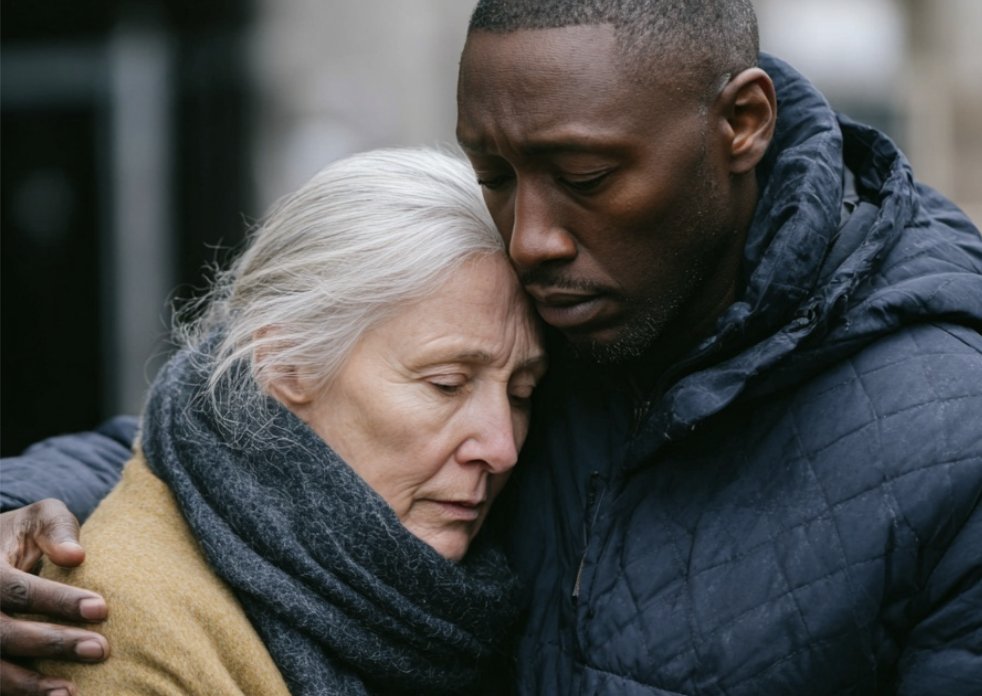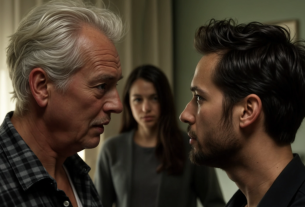One crisp October morning in 2003, Margaret Hayes — a widow known throughout her quiet neighborhood for her famous lemon tartlets and gentle care for stray cats — quietly closed her front door behind her and stepped outside. This time, she wandered without any clear destination.
It was one of those rare days when loneliness isn’t just an emotion but something you can almost hear: the creak of an empty chair, the echo of footsteps that aren’t there, a dinner plate set for two when you’re truly alone.
An hour later, Margaret found herself standing before the weathered gates of the city shelter — a place she hadn’t visited since delivering Christmas gifts to children without families. Today, she came with no plan. But behind that worn door, waiting quietly, was a boy in an oversized red sweater. His skin was the color of dark chocolate, and his eyes held a strange light — pale, almost translucent, like captured fragments of a winter sky.
“What’s his name?” Margaret asked softly.
“He doesn’t have one,” the shelter worker replied. “He was left here two weeks ago. No papers, no history. No one’s come looking. Probably just another ‘child from nowhere.’”
Around his wrist hung a homemade bracelet — a strip of fabric stitched with buttons and two letters: “Ka.”
Margaret hadn’t planned on having a child. Especially not at sixty. And certainly not a quiet stranger with no past. But with a calm determination, she said:
“May I take him?”
That single sentence changed the course of both their lives forever.
She named him Cairo. He rarely cried, hardly ever got sick, and by two years old, he was repeating sounds with uncanny precision. By five, he read labels and studied maps pinned above his bed. At seven, he repaired a broken toaster without really understanding how. It was as if some invisible order lived inside him — a mystery adults couldn’t unravel.
At night, Cairo sometimes murmured in his sleep — not in English, nor baby babble, but in a haunting ancient song:
“Ka-faro amma… Ka-faro amma…”
Margaret wrote down the words and brought them to a university linguistics professor. His response was astonishing:
“It closely resembles a lost dialect from the African coast — one long thought extinct.”
Margaret stopped pressing questions and began to understand: this boy carried something deeper. Something hidden.
By seventeen, Cairo had become a cybersecurity prodigy — building secure servers for charities and speaking at international conferences. Yet he never parted with his bracelet — faded, worn, missing buttons. To him, it was no mere trinket but a symbol — a key to a mystery he was destined to unlock.
One winter day, Cairo stumbled upon an old 2002 immigration file in an archive. The document bore a barely visible seal, almost erased by time — but he recognized the symbol from one of his bracelet’s beads.
It belonged to the Kadura Initiative — a secret humanitarian project linked to the exiled leader of the fictional African nation Vantara.
The leader’s name was Kamari Ayatu, who vanished after a failed coup in 2003.
Cairo’s mind raced: “Ka” on the bracelet… could it be the start of “Kamari”?
He ran his childhood photo and a portrait of Ayatu through facial recognition software — the match was 92%.
He wasn’t just a nameless shelter child. He was the son of a man history called a traitor or a hero, depending on who told the story.
Margaret and Cairo traveled to Geneva, where UN archives held encrypted files on the Kadura Initiative. And there, hidden inside the bead, was a microchip. After days of hacking, they unlocked a video.
On screen appeared a man in a sharp suit, holding a baby.
“If you’re watching this, I have failed. They call me a dictator, but I defended my country. This child is my last hope. He won’t remember me, but he’s my son — the one who will decide Vantara’s future.”
Cairo sat frozen. Suddenly, all his years of questions and fears had meaning. He was not forgotten. He was hidden. Protected. Chosen.
The files contained more — blueprints, records, passwords to secret funds Kamari had set aside to rebuild devastated lands. Only a true heir’s DNA could unlock them.
“I don’t know what to do,” Cairo confessed over the phone, voice shaking.
“To me, you have always been my son,” Margaret answered. “If your father trusted you, it means he believed you could finish what he started.”
Cairo never sought power. Instead, he became a builder of futures — founding anonymous aid funds, building schools, purifying water, and launching tech centers. First in Vantara, then worldwide. His name never made headlines, but the UN began to speak of The Cairo Project.
One evening, back home, Margaret sipped tea on the veranda as the sun set.
“Today, the paper said, ‘Anonymous donor restores hospital in Cairo province,’” she smiled.
“I like that headline,” he replied.
“But you’re still my boy?”
“Always.”
Later, at a UN summit, he spoke behind a glass panel — nameless but unforgettable:
“I was raised to believe love needs no proof. I am here because someone once gave me a chance to begin again.”
Offered political power, he declined.
“I am no king,” Cairo said with a smile. “I am a gardener. I plant hope.”
Today, a tree stands in a small African village, planted in his honor. It blooms every spring. No one knows his true name, but all know this — some people don’t wait for thanks. They simply make the world better.



